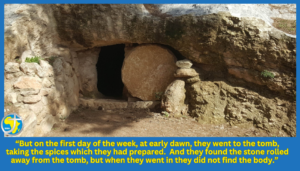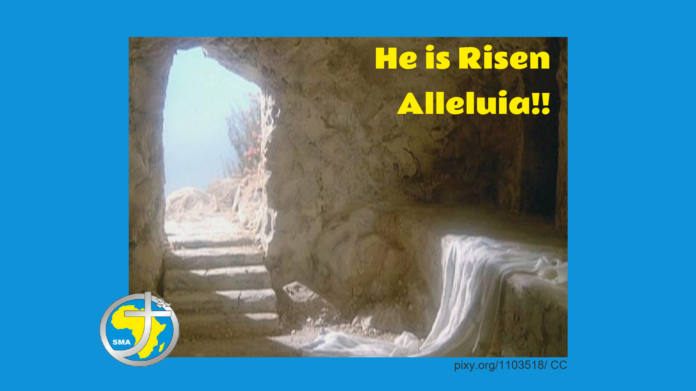It is essential to establish Easter as an event. This emerges in the Gospels themselves when details of the burial of Jesus are recounted and in Matthew where the Roman soldiers are paid a ‘considerable sum of money’ to lie that ‘His disciples came during the night and stole him away while we were asleep.’ The Achilles heel of this assertion is their admission of guilt, that they were asleep and off their guard. The conspiracy against Jesus continues after his death with the need for a cover up by those who have been exposed as murderous and lying thugs. It was not the first time that they corrupted others with bribery, conspiring to sell the Son of Man for the sake of some silver. The Easter event and the Passion it emerges from are at the core of the kerygma[1], as we hear in today’s first reading – ‘Now, I [Peter] and those who were with me can witness…to the fact that they killed him by hanging him on a tree, yet three days afterwards God raised him to life’. Luke’s line, ‘He is not here but has risen’ (24:5), both heralds and hails Easter as an historical event.
The Easter event engenders experiences which are recounted as encounters between Jesus and his disciples in the Resurrection narratives. These are the most beautiful stories in Scripture – the glorified Jesus greets Mary by name in the garden, echoing the tenderness of the Song of Songs; the Risen Christ on the road to Emmaus transforms two terrified disciples, turning laments into songs of rejoicing. In today’s reading from the Gospel of John Mary, Peter and John initially encounter an empty tomb. While none of the three can say, as in today’s Sequence, ‘I saw Christ’s glory as he rose’, they now know that crucifixion and death are not the conclusion of the Christ event. Their encounter with the empty tomb and burial cloths of Jesus is not an end but a beginning. It is the blessed fate of the Beloved Disciple to be the first to have faith in the Resurrection, for ‘he saw and he believed’. While each of them will encounter the Risen Jesus personally, from now on they will learn what Paul recommends in today’s Second Reading, to let their ‘thoughts be on heavenly things [for] now the life [they] have is hidden with Christ in God’.
In an address on the 15th of March (just over two weeks ago) to participants in the ‘Plenary of the Dicastery for Evangelisation, its Section for the fundamental questions of evangelisation in the world’, Pope Francis stated that ‘in order for faith in the Risen Christ, who is the heart of evangelisation, to be transmitted there needs to be a significant experience which is lived in the family and Christian community as an encounter with Jesus Christ who changes life. Without this encounter which is real and existential there will  always be those who yield to the temptation of making faith a theory and not a witness [to a way] of life’.[2] With his emphasis on encounter here (and indeed elsewhere), Francis expresses that evangelisation emerges from and is energised by the experience of being engaged by the Easter Christ.
always be those who yield to the temptation of making faith a theory and not a witness [to a way] of life’.[2] With his emphasis on encounter here (and indeed elsewhere), Francis expresses that evangelisation emerges from and is energised by the experience of being engaged by the Easter Christ.
As event Easter happened historically and faith believes in the Resurrection of Jesus by God the Father; as encounter Easter holds out holiness and love embraces the Risen Christ; as evangelisation Easter empowers the mission of the church and hope expands the Resurrection through the energy of the Holy Spirit. Easter enables us to experience, enjoy and exclaim the lovely, lyrical line of Saint Clement of Alexandria, ‘Christ has turned all our sunsets into dawns’.
Fr Kevin O’Gorman SMA
[1] The proclamation of the Good News (or Gospel) of Jesus life, death and resurrection.
[2] Pope Francis, 15th March 2024 (my translation).

